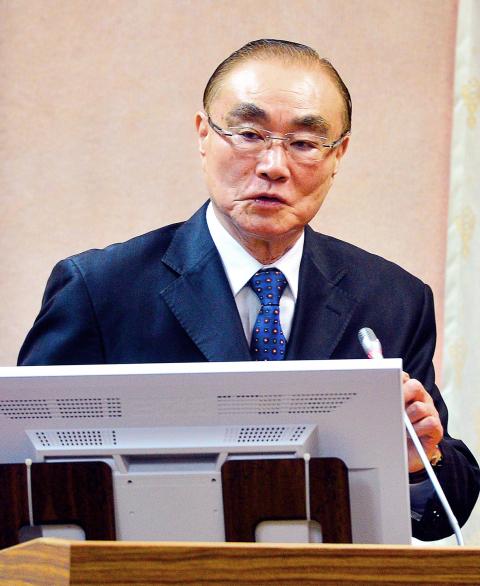The Ministry of National Defense yesterday confirmed for the first time that China has Dong Feng-16 (DF-16) missiles aimed at Taiwan in a bid to increase military pressure on the nation.
In a report delivered to the legislature’s Foreign and National Defense Committee, the ministry said Beijing has stepped up military threats toward Taiwan, pushing for military reforms and advancing its joint forces operations.
“In recent years, China’s navy and air force have introduced new warships, domestically produced fighter jets — including the Chengdu J-10, Shenyang J-11 and Shenyang J-15 — and Russian-made Sukhoi Su-35 multipurpose fighter jets, and put its latest stealth fighter, the J-20, into service,” the ministry said.

Photo: Wang Yi-sung, Taipei Times
The Chinese People’s Liberation Army Rocket Force has deployed DF-16 ballistic missiles, capable of conducting precise strikes on Taiwan proper, it added.
According to military sources, the DF-16 medium-range ballistic missile is guided and can carry multiple warheads, making it much more difficult to intercept.
Minister of National Defense Feng Shih-kuan (馮世寬) said recent events indicate that Beijing is seeking to stir up domestic discontent in Taiwan by increasing its military activities to force Taipei to fall in line with its cross-strait policy.
Feng cited as examples China’s first and only aircraft carrier, the Liaoning, passing through the first island chain in international waters off eastern Taiwan in December last year, as well as retired Chinese military officers’ repeated warnings about the risks of military conflict across the Taiwan Strait.
Responding to a question from Democratic Progressive Party (DPP) Legislator Liu Shih-fang (劉世芳) about Taiwan’s ability to intercept and counter DF-16 missiles, Feng said the Patriot Advanced Capability-3 (PAC-3) missile systems can meet the task.
“As the DF-16 is released at a high altitude and targets a single area, we are able to counter the missile as it passes through the atmosphere,” Feng said.
Lieutenant General Chiang Chen-chung (姜振中), director of the ministry’s Office for Operations and Planning, said the PAC-3 missile system can effectively take down the DF-16 when it is flying between 40km and 70km away, preventing it from hitting Taiwanese soil.
To improve the nation’s integrated air defense capabilities and in response to an increased Chinese military presence in the area, the ministry earlier this month said that it has deployed PAC-3 missile batteries to Hualien and Taitung counties.
Dismissing US President Donald Trump’s reported plans to announce new arms sales to Taiwan after a proposed meeting with Chinese President Xi Jinping (習近平) next month, Feng said the government has yet to talk to Washington about weapons needs.
“Our policy is to consider any kinds of weapons that can truly increase the nation’s defensive capabilities,” Feng said, expressing hope that the US would authorize a large arms sale package soon.
Additional reporting by Lo Tien-bin

CHAOS: Iranians took to the streets playing celebratory music after reports of Khamenei’s death on Saturday, while mourners also gathered in Tehran yesterday Iranian Supreme Leader Ayatollah Ali Khamenei was killed in a major attack on Iran launched by Israel and the US, throwing the future of the Islamic republic into doubt and raising the risk of regional instability. Iranian state television and the state-run IRNA news agency announced the 86-year-old’s death early yesterday. US President Donald Trump said it gave Iranians their “greatest chance” to “take back” their country. The announcements came after a joint US and Israeli aerial bombardment that targeted Iranian military and governmental sites. Trump said the “heavy and pinpoint bombing” would continue through the week or as long

TRUST: The KMT said it respected the US’ timing and considerations, and hoped it would continue to honor its commitments to helping Taiwan bolster its defenses and deterrence US President Donald Trump is delaying a multibillion-dollar arms sale to Taiwan to ensure his visit to Beijing is successful, a New York Times report said. The weapons sales package has stalled in the US Department of State, the report said, citing US officials it did not identify. The White House has told agencies not to push forward ahead of Trump’s meeting with Chinese President Xi Jinping (習近平), it said. The two last month held a phone call to discuss trade and geopolitical flashpoints ahead of the summit. Xi raised the Taiwan issue and urged the US to handle arms sales to

BIG SPENDERS: Foreign investors bought the most Taiwan equities since 2005, signaling confidence that an AI boom would continue to benefit chipmakers Taiwan Semiconductor Manufacturing Co’s (TSMC, 台積電) market capitalization swelled to US$2 trillion for the first time following a 4.25 percent rally in its American depositary receipts (ADR) overnight, putting the world’s biggest contract chipmaker sixth on the list of the world’s biggest companies by market capitalization, just behind Amazon.com Inc. The site CompaniesMarketcap.com ranked TSMC ahead of Saudi Aramco and Meta Platforms Inc. The Taiwanese company’s ADRs on Tuesday surged to US$385.75 on the New York Stock Exchange, as strong demand for artificial intelligence (AI) applications led to chip supply constraints and boost revenue growth to record-breaking levels. Each TSMC ADR represents

State-run CPC Corp, Taiwan (CPC, 台灣中油) yesterday said that it had confirmed on Saturday night with its liquefied natural gas (LNG) and crude oil suppliers that shipments are proceeding as scheduled and that domestic supplies remain unaffected. The CPC yesterday announced the gasoline and diesel prices will rise by NT$0.2 and NT$0.4 per liter, respectively, starting Monday, citing Middle East tensions and blizzards in the eastern United States. CPC also iterated it has been reducing the proportion of crude oil imports from the Middle East and diversifying its supply sources in the past few years in response to geopolitical risks, expanding